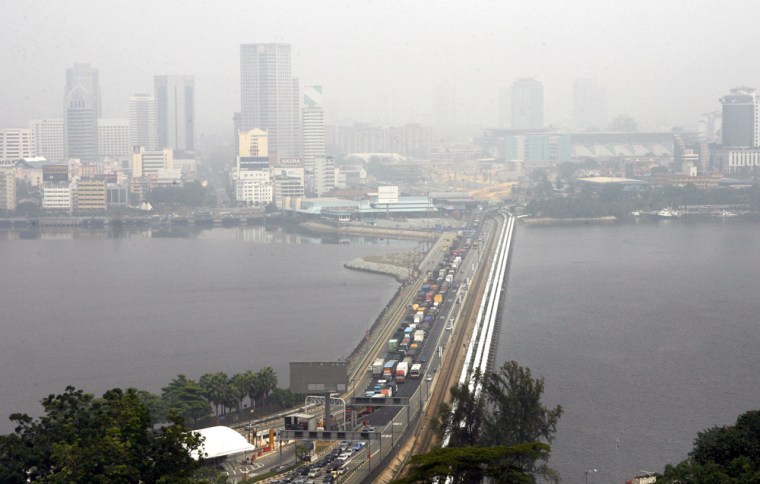An annual haze over Southeast Asia caused by forest fires in Indonesia is expected to worsen this year due to changing weather patterns, the region's environment ministers warned Tuesday.
The ministers noted that Indonesia's anti-pollution efforts and wetter weather conditions caused by the La Nina phenomenon — the abnormal cooling of sea temperatures in the Pacific Ocean — had helped suppress the haze problem last year.
But the effects of La Nina will wear off by the third quarter this year, the ministers from Malaysia, Indonesia, Brunei, Singapore and Thailand said in a joint statement after a meeting to discuss anti-haze measures.
"This could lead to drier periods and the possibility of escalating hotspot activities during the coming dry season," the statement said.
Malaysia, Singapore and Thailand have complained since 1997 about haze drifting from Indonesia, where annual fires are started as part of seasonal land-clearing especially on Sumatra island and in Kalimantan on Borneo island.
The smog causes health problems and losses amounting to billions of dollars from lost tourism revenue and flight delays, among other things.
Indonesia argues it lacks the money and technical expertise to prevent or control the fires in the vast archipelago nation.
Indonesian Environment Minister Rachmat Witoelar told reporters that efforts are under way to fight cross-border smoke by banning traditional slash-and-burn practices by farmers, timber firms and plantations, and stiffer penalties for open burning.
Indonesia's government agencies and the private sector have also raised their budget for land and forest fire control this year to more than $87 million, he said. He didn't give the 2007 budget.
"We are consolidating our efforts and working together with our neighbors. It is not easy because we have vast tracts of dry and combustible land. We are not trying to delude ourselves that we are going to wipe out all the haze," Witoelar said.
Under a pact to be signed in June, Malaysia will help Indonesia set up an early warning system on forest fires, boost peat land management and strengthen zero burning policies in Riau in northern Sumatra.
"There is no other way but to walk together, to have common program, common activities that we hope can reduce this problem," said Malaysian Environment Minister Douglas Unggah Embas.
Singapore has already committed 724,000 to develop a fire danger rating system and build resources in Jambi in northern Sumatra, officials said.
However, Indonesia has yet to ratify a 2002 regional agreement on controlling cross-boundary haze, setting back efforts to create a regional coordinating center to mobilize resources to fight the fire.
The ratification has been delayed because of concerns that some provinces are not ready to implement zero-burning policies.
